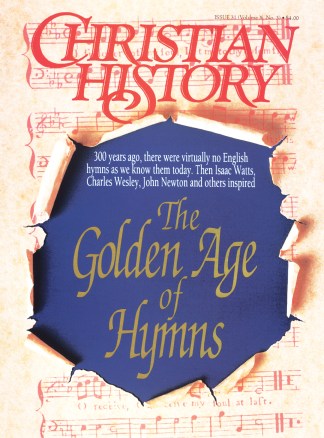Philip Doddridge (1702–1751) refused a university scholarship and became a Dissenting minister. He wrote hymns primarily as summaries to his sermons. They were taught, line by line, to the congregation each Sunday.
At Isaac Watts’s urging, Doddridge opened an academy and trained 200 students, over 120 of whom entered the ministry. Later he helped to found an infirmary, and he championed foreign missions before it was fashionable. His treatise, The Rise and Progress of Religion in the Soul—based on an outline by Isaac Watts—was translated into seven languages. But he is best known as the author of approximately 400 hymn texts, including “O Happy Day that Fixed My Choice,” which still appears in many hymnals.
George Whitefield (1714–1770) receives little notice in history books for his hymns, there being much more to say about his incredible preaching career. According to one source, Whitefield began his “career of revival song” in 1738, the year of his first preaching journey to America.
Urgently concerned about the lower classes, Whitefield created hymns based on music they knew. Writes Stuart C. Henry: “Thinking it wrong for the ‘devil’s house to have all the good tunes,’ [Whitefield] had appropriated some popular airs from favorite stage operas of the day and set sacred words to them.… [T]he strains of such music-hall ballads as ‘Love in a Village,’or ‘Maid of the Mill’ floated from the Moorfields Tabernacle, … What kind of religion sings this kind of song? asked London.… What kind of person is Whitefield, and what sort of religion does he teach?”
Whitefield’s Collection of Hymns, for “social worship,” was designed to be used by his congregation in London, and first appeared when the great Tabernacle was erected there in 1753.
William Williams (1717–1791) accomplished in Wales what Watts and the Wesleys had done in England, writing approximately 800 hymns and traveling some 100,000 miles over forty-three years. He preached and sang to the Welsh people in their own language, but he also wrote English hymns such as “Guide Me, O Thou Great Jehovah.”
John Cennick (1718–1755), for a time George Whitefield’s chief assistant, spent his short life in tireless preaching and evangelism in Ireland and England. He produced several volumes of hymns and is known for “Children of the Heavenly King” and the table grace “Be Present at Our Table, Lord.”
John Fawcett (1739–1817) was converted, at age 16, under the preaching of George Whitefield. He became a Baptist pastor in Yorkshire, conducting an academy for ministers and writing more than 160 hymns, the most remembered being “Blest Be the Tie that Binds.”
Augustus Toplady (1740–1778) was a priest in the Church of England and verbal opponent of the Wesleys. His “Rock of Ages” actually used words of a Wesley hymn against them. Ironically, “Rock of Ages” is today included in Methodist hymnals (and nearly every other English-language hymnal).
Timothy Dwight (1752–1817), Jonathan Edwards’s grandson, lived out one of the most impressive careers of that era. He graduated from Yale at 17 and served as chaplain to George Washington during the Revolutionary War. Later he became a Congregational pastor and a representative in the Connecticut legislature, and he went back to Yale to teach and hold the president’s chair. Dwight revised Watts’s Psalms and Hymns in 1797 and added to it thirty-three of his own hymns, among them “I Love Thy Kingdom, Lord.”
Copyright © 1991 by the author or Christianity Today/Christian History magazine. Click here for reprint information on Christian History.










